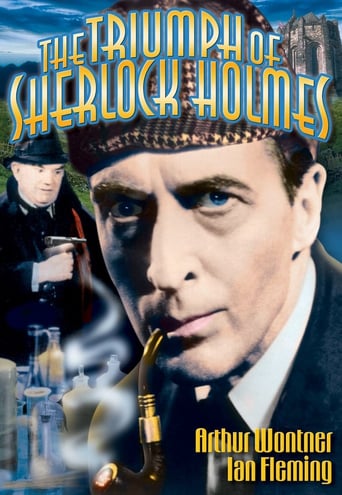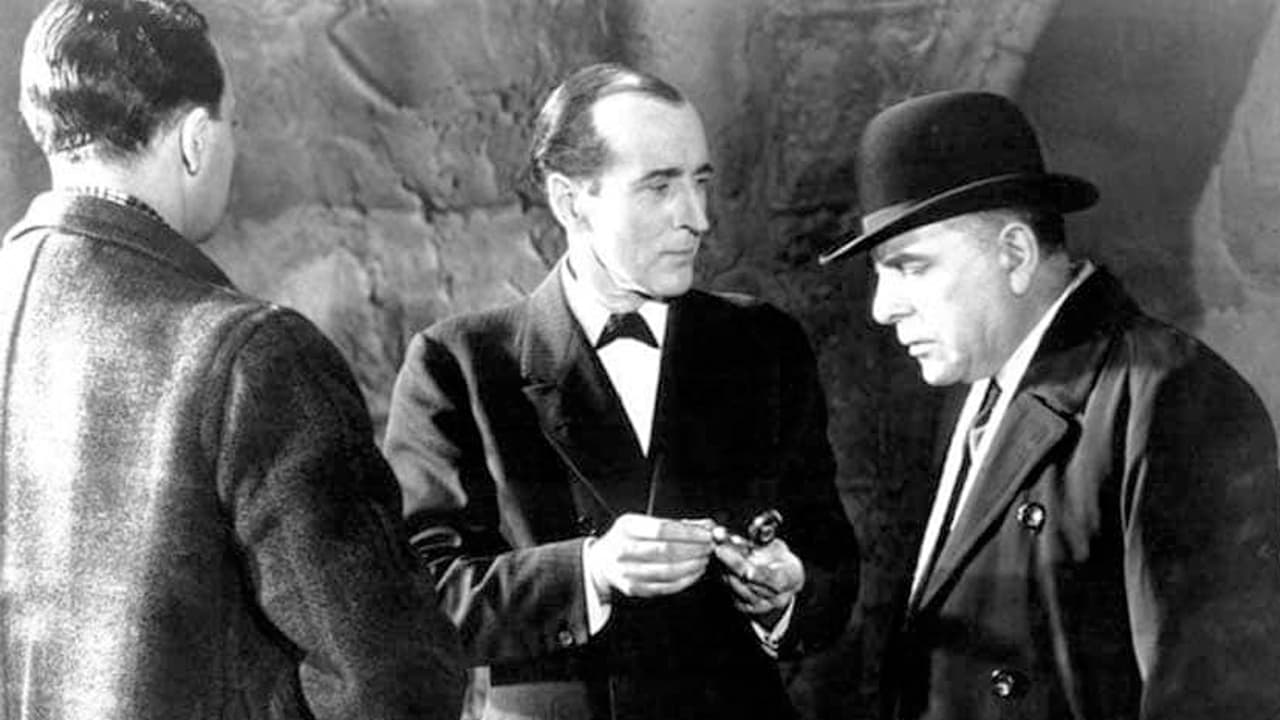TheLittleSongbird
Am a huge fan of Sherlock Holmes and get a lot of enjoyment out of Arthur Conan Doyle's stories. Also love Basil Rathbone's and especially Jeremy Brett's interpretations to death. So would naturally see any Sherlock Holmes adaptation that comes my way, regardless of its reception.Furthermore, interest in seeing early films based on Conan Doyle's Sherlock Holmes stories and wanting to see as many adaptations of any Sherlock Holmes stories as possible sparked my interest in seeing 'The Triumph of Sherlock Holmes', part of the series of film with Arthur Wontner. Would also see anything that has Holmes encountering his arch-nemesis Professor Moriaty. 'The Triumph of Sherlock Holmes', based on one of Conan Doyle's longer and best stories, turned out to be very much worthwhile. Not one of the best Sherlock Holmes adaptations certainly, the best of the Jeremy Brett adaptations and films of Basil Rathone fit under this category. It's also not among the worst, being much better than any of the Matt Frewer films (particularly 'The Sign of Four') and the abominable Peter Cook 'The Hound of the Baskervilles'.It's not perfect. The sound quality is less than great, while some of the pace could have been tighter, the over-reliance on the flashback structure bogs it down a bit, and some of the dialogue unnecessarily rambles a bit. The Holmes retiring aspect is agreed out of character. However, the period detail is handsome and evocative. The writing generally is thought-provoking, Holmes' deductions and crime solving are a huge part of the fun as well as very true in detail and spirit to Conan Doyle's writing, the mystery and suspense is generally intact and the story is intriguing and not hard to follow.Arthur Wontner may technically have been too old for Holmes but he did not look too old and his portrayal is on the money, handling the personality and mannerisms of the character spot on without over-doing or under-playing. Ian Fleming is a charming, loyal, intelligent and amusing Watson, with nice chemistry between him and Wontner, really liked his inferior attempts at deduction. The support is solid, with the best coming from Lyn Harding's sinister Moriaty.In summary, not quite triumphant but very worthwhile. 7/10 Bethany Cox
MartinHafer
While IMDb says that this was based on a Conan Doyle story, you'd have a hard time recognizing the original. That's because so many details were changed and the entire Moriarty plot line was ridiculous--having nothing to do with the original stories. For the Sherlock Holmes fans out there, Moriarty died at Whisteria Falls--and the whole angle about Holmes going into retirement is poppycock. What also is VERY problematic for me, and it's less because it violates the Holmes canon, is the way the story is told. About half the film is told in flashback!!! What a sloppy and boring way to tell a story! Overall, because of the many problems, this is among the worst of the Arthur Wontner films of Sherlock Holmes. There are some very, very good ones and some bad ones. This is a bad one--due less to the acting and more for the bizarre and convoluted storytelling.
xredgarnetx
TRIUMPH OF SHERLOCK HOLMES stars British thespian Arthur Wontner, today a forgotten interpreter of Holmes who would soon be overshadowed by the glossy American productions starring the illustrious Basil Rathbone, for some people the greatest Holmes ever. Wontner is actually a terrific Holmes, and looks remarkably like the first illustrations of Holmes. Wontner also prepared the dialog for the movie, and sticks relatively close to the source material, in this case THE VALLEY OF FEAR. Ian Fleming's Dr. Watson is a lot closer to the Watson of the stories, a retired Army officer and dapper fellow with an eye for the ladies. Wontner and Fleming have a palpable chemistry and affectionate interplay that reminds me more of the Holmes and Watson of the original stories than most other cinematic Holmes and Watsons. If you don't know the plot of VALLEY, and I admittedly had forgotten, you will be kept guessing right up to the very end the identity of the killer. A word on Lyn Harding as Holmes' archfoe Moriarty: He is as good a Moriarty as I have ever seen on screen. What keeps me from giving this film an extra point is its primitiveness. By 1935, most films looked and sounded a lot better than this. Also, this is a "modern" Holmes adaptation; that is to say, Holmes has been moved forward in time to the present day, in this case 1935, which may save on costumes and sets, but slightly impairs the atmosphere. See it for its historical value, and also to see someone other than Rathbone tearing it up as the world's greatest detective.
classicsoncall
Arthur Wontner does the honors as Sherlock Holmes in this 1935 film, while the non-Bond Ian Fleming portrays a dapper Dr. John Watson. This was my first experience of their pairing, and they play off each other well, though the running gag of Watson's nudging Holmes to be introduced to every new character wears thin after a while. Somehow, I think Holmes was sharp enough to get around to it eventually.The story is told in large part via flashback, taking us to America and a secret organization known as the Scowlers, a band of murderers and blackmailers in an area of Pennsylvania. It relies on the recollections of Ettie Douglas (Jane Carr) recounting the story of her husband John, who went undercover as a member of the Freemen Scowlers, infiltrating their number for the local police. In doing so, Douglas earned the wrath of Scowler goon Balding (Ben Welden), who in present time has hired the evil Professor Moriarty to kill Douglas. Moriarty, here portrayed by Lyn Harding, is presented as somewhat of a magician, eerily appearing and disappearing in a compact room to Balding's amazement.Holmes' unique powers of deduction include a scene where he turns his attention to Watson's shaving routine. So it shouldn't come as a surprise that he leads Watson down a path to decoding a numerical message pointing to a murder at Birlstone Castle. Since the murder already took place, it's up to Holmes to uncover the perpetrator.A lot of attention is centered on the rate of burning candles and a missing dumbbell (not a human) to solve the crime, and it's uncanny that Holmes knows enough to trawl the moat with an umbrella handle (?) outside a castle window to find a clue. A better one would have been checking the dead body, since the actual victim (Balding) had a different build and was shorter than Douglas. I'm sure Holmes took that into account, it just wasn't mentioned.Though the story was interesting enough, and is recommended for Holmes fans, I was dismayed by the apparent death of Professor Moriarty. Granted, this film was released in 1935, but I viewed it after seeing 1943's "Sherlock Holmes and The Secret Weapon", and 1945's "The Woman in Green". In all three films, Moriarty meets his apparent demise by falling from a height. I would have appreciated some originality, at least in the latter two.



 AD
AD



